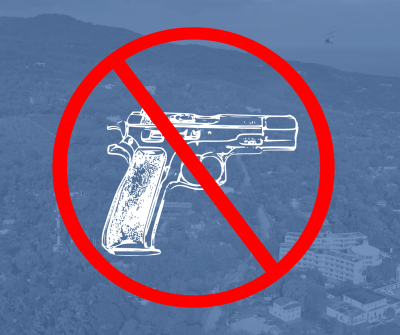
We are getting closer to unpacking the complicated web of laws and agencies responsible for preventing U.S.- made weapons from getting into the hands of criminal elements in Haiti.
On Wednesday Quixote Center convened partner organizations together with the Department of Homeland Security (DHS) staff director in charge of global trade violations and export enforcement coordination.
Haiti is saturated with small arms and ammunition from the United States, making Haiti practically unlivable. From Maryknoll Lay Missioner Sami Scott, one of our partners working in Gros Morne, Haiti:
In the five years I have served in Haiti, the number of guns in the hands of criminals has increased dramatically, especially since 2021. These are all coming into the country illegally. They are all sourced in the US and trafficked here by various routes.
Everyone I know has been impacted by the gangs. Either they or someone in their family has been robbed, chased off their land or out of their homes, kidnapped, or killed. Haiti cannot know peace or have a chance to prosper until the illegal trafficking of arms is stopped and the gangs that have them are controlled. Any advancement, including elections, education, food security, reforestation, jobs creation, or infrastructure improvements cannot happen until there is security. The United States must stop being complicit in the insecurity of Haiti and the destruction it has caused. The US can stop the illegal trafficking of arms from the States into Haiti. To let it continue is a crime against humanity.”
Just yesterday gangs attacked Haiti’s international airport and shot up jetliners. Two week ago, they shot up Gros Morne.
Insecurity is why so many Haitian people are trying to leave their homeland. DHS eventually encounters them at the border with Mexico.
DHS explained that weapons trafficking is tied to large criminal networks that also traffic in drugs and exploitation of people. Especially in the Caribbean, these are large, transnational, organized criminal networks. Until very recently, U.S. enforcement resources were focused primarily on narcotics as well as human trafficking. Over the past year they have prioritized a better alignment of resources so that they can include gun trafficking in their enforcement capability.
They have a criminal gun intelligence unit, operational since June 2022, to identify criminal elements purchasing guns and share information with CARICOM states, including Haiti. In 2023 their operation seized 336 firearms and 26,000 rounds of ammunition. They are building on this success, in collaboration with other agencies, by working on a package of strategies related to firearms export crimes. The Department of Justice has appointed a Caribbean firearms coordinator to prosecute weapons crimes, and the State Department is working to strengthen the capacity of the Haitian National Police.
DHS told us that they have made this issue a priority and they understand the gravity and urgency of the situation. But stopping the flow out of Florida is a challenge. Part of the challenge is the chaotic Miami River port, where goods flow out to Haiti with insufficient oversight. They cite a main issue as resources: the DHS budget is heavily weighted toward enforcement at the U.S.-Mexico border. Another problem is that shipping companies look the other way, and they should know what they are carrying.
This week’s meeting helped me to make a crucial connection:
Because our country prioritizes keeping migrants from entering at the U.S.-Mexico border, DHS has more limited resources to combat the criminal organizations responsible for trafficking the weapons that are a root cause of migration.
Our government appropriates huge sums of money for Mexico border enforcement because they and the public perceive a migration crisis, a crisis that is in large part of our own making.
Quixote Center and our partners are currently contemplating next steps. It is critical that we pass the ARMAS ACT, which will provide additional oversight over export licenses for guns and ammunition. Thank you to each of you who have taken action. We invite you to forward our action to five more people to extend our influence. Congressional offices count the number of letters they receive on each issue.
We are continuing to work toward a Senate version of this legislation. Stay tuned for more opportunities to take action. Thank you for your support.


